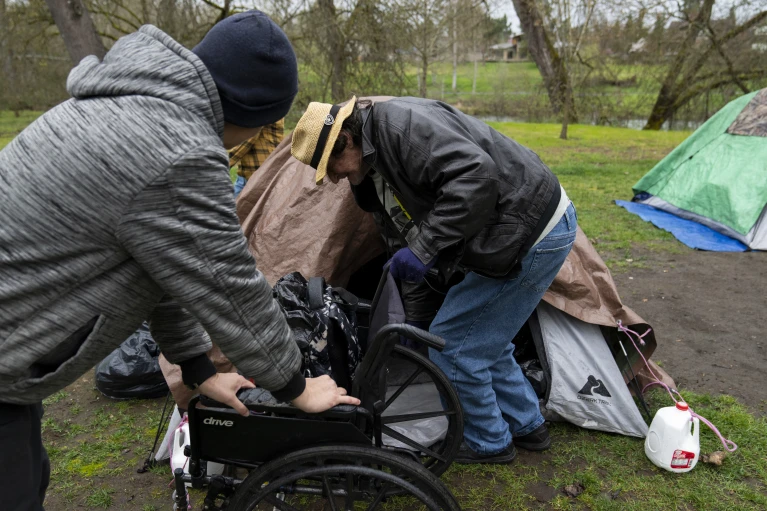The situation unfolding in Grants Pass, Oregon, encapsulates a poignant narrative that resonates beyond the confines of this small, leafy community.
Against the backdrop of a pickleball game disrupted by the urgent arrival of an ambulance, the complexities of homelessness and the challenges faced by both the marginalized individuals and the local authorities come to the forefront.
As paramedics navigated through a park dotted with tents, hastily erected by the town’s homeless population, the juxtaposition of leisure and crisis painted a stark picture of the multifaceted issues at play.
The conundrum faced by Grants Pass mirrors a larger, national discourse on homelessness that has reverberated all the way to the hallowed chambers of the U.S. Supreme Court.
The impending court case, scheduled for April 22, holds profound implications not just for this Oregon town but for communities across the country grappling with similar dilemmas.
At the heart of the matter lies the contentious debate on the legality of fining or incarcerating individuals for camping in public spaces, a practice that has become a flashpoint in the broader conversation on homelessness.
Mayor Sara Bristol, the figurehead of Grants Pass, finds herself at the epicenter of this maelstrom, lamenting how the issue of homelessness has come to define her tenure.
Her sentiments encapsulate the frustration and helplessness experienced by many local officials who are thrust into the forefront of a crisis that transcends municipal boundaries.
The involvement of political figures ranging from Governor Gavin Newsom of California to a coalition of conservative-led states underscores the far-reaching implications of this case, as it grapples with the delicate balance between compassion and law enforcement in addressing homelessness.
The historical context of Grants Pass’s struggle with homelessness, dating back a decade when city council members debated strategies to discourage homeless encampments, underscores the enduring nature of this societal challenge.
The issuance of hundreds of citations over the years reflects the town’s efforts to navigate a complex terrain where compassion, public safety, and legal frameworks intersect.
The moral and ethical dilemmas inherent in addressing homelessness are laid bare in the experiences of individuals like the 80-year-old man and the visually impaired woman who face the imminent threat of fines for overstaying their welcome in public spaces.
As the nation grapples with the nuances of homelessness and the legal frameworks that govern public spaces, Grants Pass emerges as a microcosm of a broader societal conundrum.
The clash between individual rights, public safety, and the duty of care owed to the most vulnerable members of society underscores the intricate tapestry of challenges that confront communities nationwide.

The forthcoming Supreme Court case stands as a pivotal moment in the ongoing dialogue on homelessness, underscoring the need for nuanced, compassionate, and sustainable solutions that address the root causes of this pervasive issue.
In conclusion, the plight of Grants Pass serves as a poignant reminder of the human faces behind the statistics and legal debates surrounding homelessness.
It calls upon us to confront the complexities of this societal challenge with empathy, pragmatism, and a commitment to fostering inclusive communities where all individuals are afforded dignity and support.
The outcome of the upcoming court case will not only shape the future of Grants Pass but will reverberate across the nation, shaping the contours of how we as a society choose to address one of the most pressing issues of our time.
The case challenging restrictions in Grants Pass, which resulted in the court expanding its ruling to deem civil citations potentially unconstitutional, sheds light on the complex intersection of homelessness, public spaces, and legal rights.
Civil rights groups and advocates for the homeless have long argued against punishing individuals for the mere fact of lacking housing, emphasizing the need for systemic solutions rather than punitive measures.
The debate in Grants Pass, particularly centered around the town’s parks, underscores the broader issue of how society grapples with homelessness and its associated challenges.
The picturesque parks in Grants Pass, known for their scenic beauty and recreational amenities, have become focal points in the ongoing discourse.
While these spaces host a variety of community events and activities, they also serve as makeshift homes for individuals experiencing homelessness.
Encampments in the parks have been marred by issues such as drug use and crime, creating tensions between public safety concerns and the rights of homeless individuals to seek shelter in public spaces.
Cassy Leach, a dedicated nurse leading a volunteer group assisting the homeless population in Grants Pass, exemplifies the compassion and practical support needed to address the multifaceted needs of this vulnerable community.
Her efforts to provide basic necessities, medical care, and empathy highlight the importance of holistic approaches to homelessness that go beyond mere enforcement of regulations.
The personal stories shared by individuals like Dre Buetow and Spurgeon offer poignant glimpses into the harsh realities faced by those living on the margins.
Buetow’s struggle with homelessness following a debilitating illness and mounting medical expenses underscores the precariousness of housing security in the face of unforeseen challenges.
Similarly, Spurgeon’s heartbreaking account of losing his brother to homelessness and witnessing his son battle addiction while living on the streets underscores the urgent need for comprehensive support systems.
The proposed solutions, such as establishing shelters with fewer restrictions or designated camping areas for the homeless, reflect attempts to balance the needs of the community with the rights of individuals experiencing homelessness.

However, the logistical and financial challenges associated with such initiatives underscore the complexities involved in addressing the root causes of homelessness and providing sustainable solutions.
As the debate continues in Grants Pass and beyond, it is crucial to approach the issue of homelessness with empathy, pragmatism, and a commitment to upholding the dignity and rights of all individuals.
By fostering dialogue, collaboration, and innovative approaches, communities can work towards creating inclusive and supportive environments where homelessness is not just a legal or policy issue, but a shared societal concern that demands collective action and compassion.
In conclusion, the case of Grants Pass serves as a microcosm of the broader challenges surrounding homelessness and public space regulations.
By engaging in thoughtful discourse, advocating for systemic change, and prioritizing the well-being of vulnerable populations, we can move towards a more equitable and compassionate society where every individual has a place to call home.
